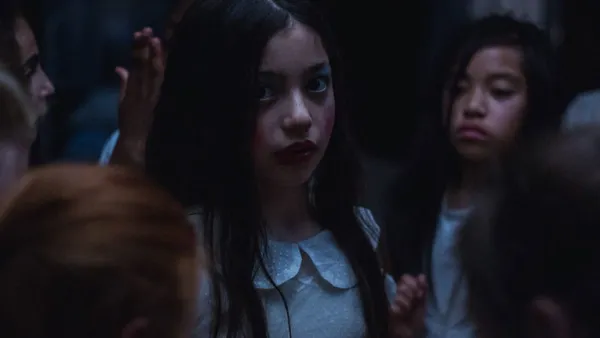Eye For Film >> Movies >> Such Small Hands (2020) Film Review
Such Small Hands
Reviewed by: Andrew Robertson

You don't need to know more than that they know they are in trouble. That means there has been trouble. That means that they know. Not just the they we can see. The they that have brought the trouble with them. There's something in the way they stand against the wall. They're brought into the room and told they know why they're here. We'll find out.
"Now we don't". Children en masse are easily made uncanny. The great creations of the gothic horror are almost always things that are very nearly but not quite like people, and as fond of them as I am, weans exist in that same proximity to the alien. Watching them growl over meatballs the line between fun and feral is a fuzzy one. The uniformity of age and institution makes all the small differences more noticeable.
Maria Martinez Bayona's film is full of moments that separate Marina from the others in the orphanage. They all had the same colour of toothbrush until she came. Light catches her slightly differently in the glow of the television on movie night. "Every night when we go to sleep we won't go to sleep." It gets more unsettling from there. Not least because that is not just a confession but an imperative.
Multiple narrators make this a tale not just of collective action but collective remembering. A whispered chorus of Twinkle, Twinkle has the feel of ritual. That's even without the blood. Without what may be collective guilt. In some dozen performances, in ink and spit, in even the repetition of spaghetti a place and a power are created.
Bayona's film (she writes/directs) is based on Las Manos Pequenas by Andres Barba, as translated by Lisa Dillman. English lacks or at least differently treats gender as an adjunct within nouns and adjectives and so the fact that there is a definite article, that there's a modifier there, that's different.
To adjust with tone is something achieved by Marina Elderton's work as composer, by the softness of Krztstof Trojnar's camera. They're adjuncts though to a central performance as Marina by Sophi Mulhall. This seems to be a debut role for her, and it's a good one. The transition from outsider to insider, the uneasy space between protagonist, antagonist, even the chemistry with the other girls singly and collectively all speak to a delicacy that reflects the script.
The nature of this story is that it's a story being told, and in that remove, that recursion, there's no small measure of strength. Adaptation is a tricky act, indeed, it's a sufficiently distinct skill of cinema that it has awards of its own. The translation (doubly so) from text to screen is not always easy, but in distilling the source to this small space Bayona has achieved something that is haunting. It's naturalistic feel does not hide the prospect of that nature being red, of tooth and claw, even if its muted palette is one of many places where it gives space to subtlety.
Reviewed on: 03 Apr 2022















